formerly eScholarship Editions


|
|
|
|
Your request for similar items found 20 book(s). | Modify Search | Displaying 1 - 20 of 20 book(s) | |
| 1. | 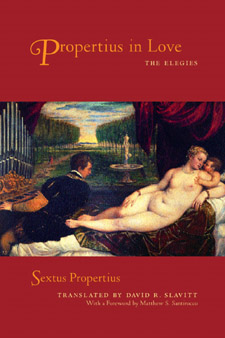 | Title: Propertius in love: the elegies Author: Propertius, Sextus Published: University of California Press, 2002 Subjects: Classics | Classical Literature and Language | Literature in Translation | Poetry | Literature in Translation Publisher's Description: These ardent, even obsessed, poems about erotic passion are among the brightest jewels in the crown of Latin literature. Written by Propertius, Rome's greatest poet of love, who was born around 50 b.c., a contemporary of Ovid, these elegies tell of Propertius' tormented relationship with a woman he calls "Cynthia." Their connection was sometimes blissful, more often agonizing, but as the poet came to recognize, it went beyond pride or shame to become the defining event of his life. Whether or not it was Propertius' explicit intention, these elegies extend our ideas of desire, and of the human condition itself. [brief] Similar Items |
| 2. | 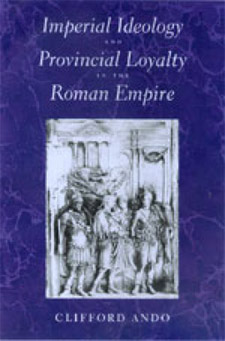 | Title: Imperial ideology and provincial loyalty in the Roman Empire Author: Ando, Clifford 1969- Published: University of California Press, 2000 Subjects: Classics | Classical History | Ancient History | Social Theory Publisher's Description: The Roman empire remains unique. Although Rome claimed to rule the world, it did not. Rather, its uniqueness stems from the culture it created and the loyalty it inspired across an area that stretched from the Tyne to the Euphrates. Moreover, the empire created this culture with a bureaucracy smaller than that of a typical late-twentieth-century research university. In approaching this problem, Clifford Ando does not ask the ever-fashionable question, Why did the Roman empire fall? Rather, he asks, Why did the empire last so long? Imperial Ideology and Provincial Loyalty in the Roman Empire argues that the longevity of the empire rested not on Roman military power but on a gradually realized consensus that Roman rule was justified. This consensus was itself the product of a complex conversation between the central government and its far-flung peripheries. Ando investigates the mechanisms that sustained this conversation, explores its contribution to the legitimation of Roman power, and reveals as its product the provincial absorption of the forms and content of Roman political and legal discourse. Throughout, his sophisticated and subtle reading is informed by current thinking on social formation by theorists such as Max Weber, Jürgen Habermas, and Pierre Bourdieu. [brief] Similar Items |
| 3. | 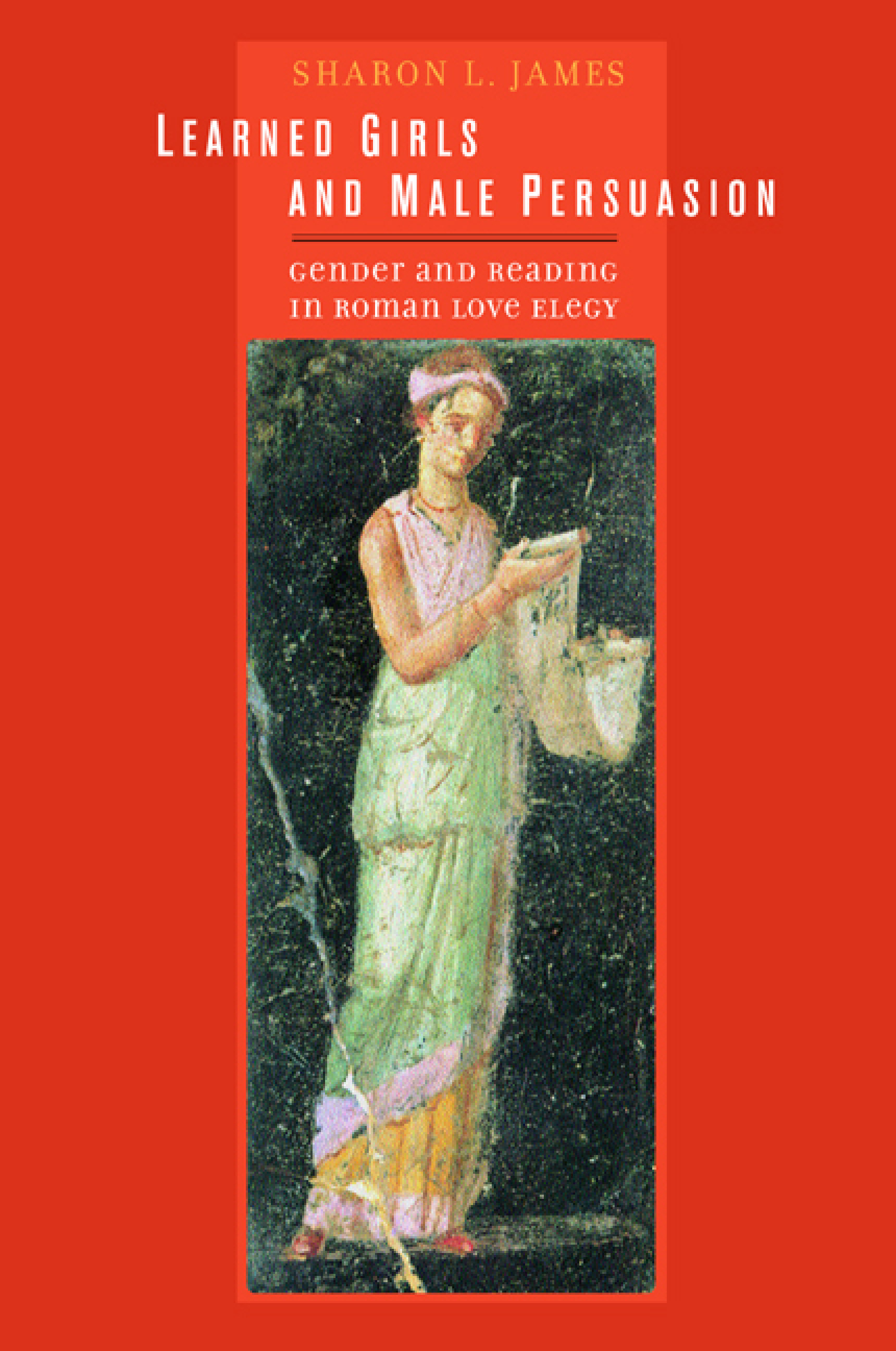 | Title: Learned girls and male persuasion: gender and reading in Roman love elegy Author: James, Sharon L Published: University of California Press, 2003 Subjects: Classics | Classical Literature and Language | Literature | Poetry | Women's Studies Publisher's Description: This study transforms our understanding of Roman love elegy, an important and complex corpus of poetry that flourished in the late first century b.c.e. Sharon L. James reads key poems by Propertius, Tibullus, and Ovid for the first time from the perspective of the woman to whom they are addressed - the docta puella, or learned girl, the poet's beloved. By interpreting the poetry not, as has always been done, from the stance of the elite male writers - as plaint and confession - but rather from the viewpoint of the women - thus as persuasion and attempted manipulation - James reveals strategies and substance that no one has listened for before. [brief] Similar Items |
| 4. | 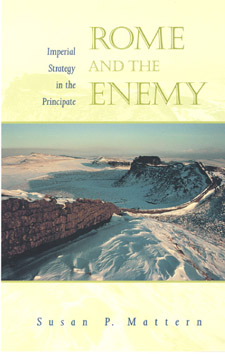 | Title: Rome and the enemy: imperial strategy in the principate Author: Mattern, Susan P 1966- Published: University of California Press, 1999 Subjects: Classics | Classical History | Classical Politics | Classical Literature and Language | Military History | Ancient History Publisher's Description: How did the Romans build and maintain one of the most powerful and stable empires in the history of the world? This illuminating book draws on the literature, especially the historiography, composed by the members of the elite who conducted Roman foreign affairs. From this evidence, Susan P. Mattern reevaluates the roots, motivations, and goals of Roman imperial foreign policy especially as that policy related to warfare. In a major reinterpretation of the sources, Rome and the Enemy shows that concepts of national honor, fierce competition for status, and revenge drove Roman foreign policy, and though different from the highly rationalizing strategies often attributed to the Romans, dictated patterns of response that remained consistent over centuries. Mattern reconstructs the world view of the Roman decision-makers, the emperors, and the elite from which they drew their advisers. She discusses Roman conceptions of geography, strategy, economics, and the influence of traditional Roman values on the conduct of military campaigns. She shows that these leaders were more strongly influenced by a traditional, stereotyped perception of the enemy and a drive to avenge insults to their national honor than by concepts of defensible borders. In fact, the desire to enforce an image of Roman power was a major policy goal behind many of their most brutal and aggressive campaigns. Rome and the Enemy provides a fascinating look into the Roman mind in addition to a compelling reexamination of Roman conceptions of warfare and national honor. The resulting picture creates a new understanding of Rome's long mastery of the Mediterranean world. [brief] Similar Items |
| 5. | 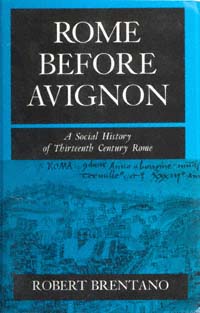 | Title: Rome before Avignon: a social history of thirteenth-century Rome Author: Brentano, Robert 1926- Published: University of California Press, 1991 Subjects: History | European History | Medieval History | Religion | Medieval Studies Publisher's Description: Robert Brentano evokes papal Rome in all its paradox and complicated brilliance. From a detailed re-creation of the physical "town" with its series of brick campanili and green and purple mosaic floors, to the intrigues of the great families, like the Orsini and Colonna, the reader is guided through complex and fascinating culture. Brentano's skill lies in his ability to combine the story of the vaulting ambition of the great families, only mildly tempered by their very real religious piety, with a vivid reconstruction of everyday life in postclassical Rome. [brief] Similar Items |
| 6. | 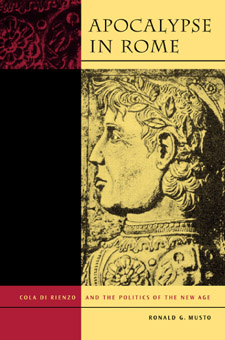 | Title: Apocalypse in Rome: Cola di Rienzo and the politics of the New Age Author: Musto, Ronald G Published: University of California Press, 2003 Subjects: History | European Studies | Medieval History | Medieval Studies | Autobiographies and Biographies | Classical Politics | Autobiographies and Biographies Publisher's Description: On May 20, 1347, Cola di Rienzo overthrew without violence the turbulent rule of Rome's barons and the absentee popes. A young visionary and the best political speaker of his time, Cola promised Rome a return to its former greatness. Ronald G. Musto's vivid biography of this charismatic leader - whose exploits have enlivened the work of poets, composers, and dramatists, as well as historians - peels away centuries of interpretation to reveal the realities of fourteenth-century Italy and to offer a comprehensive account of Cola's rise and fall. A man of modest origins, Cola gained a reputation as a talented professional with an unparalleled knowledge of Rome's classical remains. After earning the respect and friendship of Petrarch and the sponsorship of Pope Clement VI, Cola won the affections and loyalties of all classes of Romans. His buono stato established the reputation of Rome as the heralded New Jerusalem of the Apocalypse and quickly made the city a potent diplomatic and religious center that challenged the authority - and power - of both pope and emperor. At the height of Cola's rule, a conspiracy of pope and barons forced him to flee the city and live for years as a fugitive until he was betrayed and taken to Avignon to stand trial as a heretic. Musto relates the dramatic story of Cola's subsequent exoneration and return to central Italy as an agent of the new pope. But only weeks after he reestablished his government, he was slain by the Romans atop the Capitoline hill. In his exploration, Musto examines every known document pertaining to Cola's life, including papal, private, and diplomatic correspondence rarely used by earlier historians. With his intimate knowledge of historical Rome - its streets and ruins, its churches and palaces, from the busy Tiber riverfront to the lost splendor of the Capitoline - he brings a cinematic flair to this fascinating historical narrative. [brief] Similar Items |
| 7. | 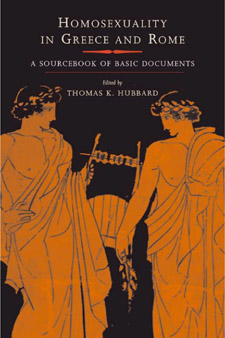 | Title: Homosexuality in Greece and Rome: a sourcebook of basic documents Author: Hubbard, Thomas K Published: University of California Press, 2003 Subjects: Gender Studies | Classics | GayLesbian and Bisexual Studies Publisher's Description: The most important primary texts on homosexuality in ancient Greece and Rome are translated into modern, explicit English and collected together for the first time in this comprehensive sourcebook. Covering an extensive period - from the earliest Greek texts in the late seventh century b.c.e. to Greco-Roman texts of the third and fourth centuries c.e. - the volume includes well-known writings by Plato, Sappho, Aeschines, Catullus, and Juvenal, as well as less well known but highly relevant and intriguing texts such as graffiti, comic fragments, magical papyri, medical treatises, and selected artistic evidence. These fluently translated texts, together with Thomas K. Hubbard's valuable introductions, clearly show that there was in fact no more consensus about homosexuality in ancient Greece and Rome than there is today. The material is organized by period and by genre, allowing readers to consider chronological developments in both Greece and Rome. Individual texts each are presented with a short introduction contextualizing them by date and, where necessary, discussing their place within a larger work. Chapter introductions discuss questions of genre and the ideological significance of the texts, while Hubbard's general introduction to the volume addresses issues such as sexual orientation in antiquity, moral judgments, class and ideology, and lesbianism. With its broad, unexpurgated, and thoroughly informed presentation, this unique anthology gives an essential perspective on homosexuality in classical antiquity. [brief] Similar Items |
| 8. | 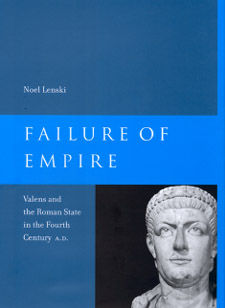 | Title: Failure of empire: Valens and the Roman state in the fourth century A.D Author: Lenski, Noel Emmanuel 1965- Published: University of California Press, 2003 Subjects: Classics | History | Classical History | Ancient History | Classical Politics | Autobiographies and Biographies Publisher's Description: Failure of Empire is the first comprehensive biography of the Roman emperor Valens and his troubled reign (a.d. 364-78). Valens will always be remembered for his spectacular defeat and death at the hands of the Goths in the Battle of Adrianople. This singular misfortune won him a front-row seat among history's great losers. By the time he was killed, his empire had been coming unglued for several years: the Goths had overrun the Balkans; Persians, Isaurians, and Saracens were threatening the east; the economy was in disarray; and pagans and Christians alike had been exiled, tortured, and executed in his religious persecutions. Valens had not, however, entirely failed in his job as emperor. He was an admirable administrator, a committed defender of the frontiers, and a ruler who showed remarkable sympathy for the needs of his subjects. In lively style and rich detail, Lenski incorporates a broad range of new material, from archaeology to Gothic and Armenian sources, in a study that illuminates the social, cultural, religious, economic, administrative, and military complexities of Valens's realm. Failure of Empire offers a nuanced reconsideration of Valens the man and shows both how he applied his strengths to meet the expectations of his world and how he ultimately failed in his efforts to match limited capacities to limitless demands. [brief] Similar Items |
| 9. | 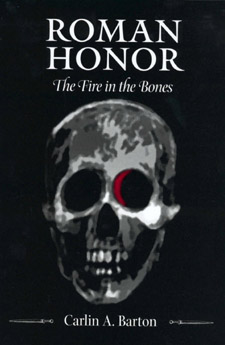 | Title: Roman honor: the fire in the bones Author: Barton, Carlin A 1948- Published: University of California Press, 2001 Subjects: Classics | Ancient History | Classical History | Classical Politics | Classical Religions | Comparative Literature Publisher's Description: This book is an attempt to coax Roman history closer to the bone, to the breath and matter of the living being. Drawing from a remarkable array of ancient and modern sources, Carlin Barton offers the most complex understanding to date of the emotional and spiritual life of the ancient Romans. Her provocative and original inquiry focuses on the sentiments of honor that shaped the Romans' sense of themselves and their society. Speaking directly to the concerns and curiosities of the contemporary reader, Barton brings Roman society to life, elucidating the complex relation between the inner life of its citizens and its social fabric. Though thoroughly grounded in the ancient writings - especially the work of Seneca, Cicero, and Livy - this book also draws from contemporary theories of the self and social theory to deepen our understanding of ancient Rome. Barton explores the relation between inner desires and social behavior through an evocative analysis of the operation, in Roman society, of contests and ordeals, acts of supplication and confession, and the sense of shame. As she fleshes out Roman physical and psychological life, she particularly sheds new light on the consequential transition from republic to empire as a watershed of Roman social relations. Barton's ability to build productively on both old and new scholarship on Roman history, society, and culture and her imaginative use of a wide range of work in such fields as anthropology, sociology, psychology, modern history, and popular culture will make this book appealing for readers interested in many subjects. This beautifully written work not only generates insight into Roman history, but also uses that insight to bring us to a new understanding of ourselves, our modern codes of honor, and why it is that we think and act the way we do. [brief] Similar Items |
| 10. | 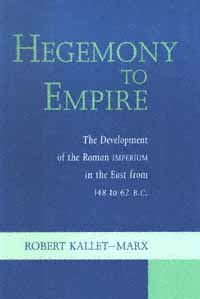 | Title: Hegemony to empire: the development of the Roman Imperium in the East from 148 to 62 B.C Author: Kallet-Marx, Robert Morstein Published: University of California Press, 1996 Subjects: Classics | History | Ancient History Publisher's Description: In one of the most important contributions to the study of Roman imperialism to appear in recent years, Robert Kallet-Marx argues for a less simplistic, more fluid understanding of the evolution of Roman power in the Balkans, Greece, and Asia Minor. He distinguishes between hegemony - the ability of the Romans to command obedience on the basis of a real or implied military threat - and the later phenomenon of empire, demonstrating that Roman imperium was not the result of the sudden imposition of geographically defined provinces or permanent armies. Rather, the integration of the Greek world into a Roman imperial system was a complex process of evolution requiring mutual adaptation by both Romans and Greeks. [brief] Similar Items |
| 11. | 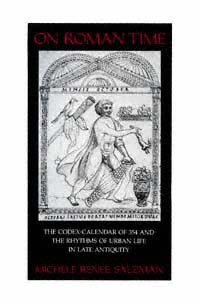 | Title: On Roman time: the codex-calendar of 354 and the rhythms of urban life in late antiquity Author: Salzman, Michele Renee Published: University of California Press, 1991 Subjects: Classics | Religion | Classical History Publisher's Description: Because they list all the public holidays and pagan festivals of the age, calendars provide unique insights into the culture and everyday life of ancient Rome. The Codex-Calendar of 354 miraculously survived the Fall of Rome. Although it was subsequently lost, the copies made in the Renaissance remain invaluable documents of Roman society and religion in the years between Constantine's conversion and the fall of the Western Empire.In this richly illustrated book, Michele Renee Salzman establishes that the traditions of Roman art and literature were still very much alive in the mid-fourth century. Going beyond this analysis of precedents and genre, Salzman also studies the Calendar of 354 as a reflection of the world that produced and used it. Her work reveals the continuing importance of pagan festivals and cults in the Christian era and highlights the rise of a respectable aristocratic Christianity that combined pagan and Christian practices. Salzman stresses the key role of the Christian emperors and imperial institutions in supporting pagan rituals. Such policies of accomodation and assimilation resulted in a gradual and relatively peaceful transformation of Rome from a pagan to a Christian capital. [brief] Similar Items |
| 12. | 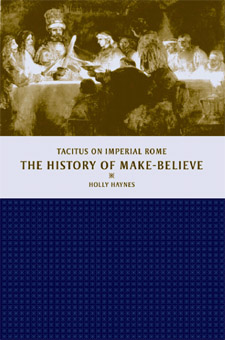 | Title: The history of make-believe: Tacitus on imperial Rome Author: Haynes, Holly Published: University of California Press, 2003 Subjects: Classics | Classical History | Classical Literature and Language | Political Theory | Ancient History Publisher's Description: A theoretically sophisticated and illuminating reading of Tacitus, especially the Histories , this work points to a new understanding of the logic of Roman rule during the early Empire. Tacitus, in Holly Haynes' analysis, does not write about the reality of imperial politics and culture but about the imaginary picture that imperial society makes of these concrete conditions of existence - the "making up and believing" that figure in both the subjective shaping of reality and the objective interpretation of it. Haynes traces Tacitus's development of this fingere/credere dynamic both backward and forward from the crucial year A.D. 69. Using recent theories of ideology, especially within the Marxist and psychoanalytic traditions, she exposes the psychic logic lurking behind the actions and inaction of the protagonists of the Histories . Her work demonstrates how Tacitus offers penetrating insights into the conditions of historical knowledge and into the psychic logic of power and its vicissitudes, from Augustus through the Flavians. By clarifying an explicit acknowledgment of the difficult relationship between res and verba, in the Histories, Haynes shows how Tacitus calls into question the possibility of objective knowing - how he may in fact be the first to allow readers to separate the objectively knowable from the objectively unknowable. Thus, Tacitus appears here as going further toward identifying the object of historical inquiry - and hence toward an "objective" rendering of history - than most historians before or since. [brief] Similar Items |
| 13. | 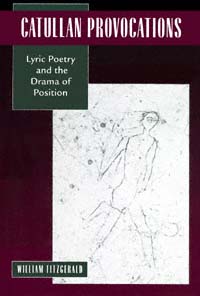 | Title: Catullan provocations: lyric poetry and the drama of position Author: Fitzgerald, William 1952- Published: University of California Press, 1996 Subjects: Classics | Comparative Literature | Classical Literature and Language | Poetry Publisher's Description: Restoring to Catullus a provocative power that familiarity has tended to dim, this book argues that Catullus challenges us to think about the nature of lyric in new ways. Fitzgerald shows how Catullus's poetry reflects the conditions of its own consumption as it explores the terms and possibilities of the poet's license. Reading the poetry in relation to the drama of position played out between poet, poem, and reader, the author produces a fresh interpretation of almost all of Catullus's oeuvre. Running through the book is an analysis of the ideological stakes behind the construction of the author Catullus in twentieth-century scholarship and of the agenda governing the interpreter's position in relation to Catullus. [brief] Similar Items |
| 14. | 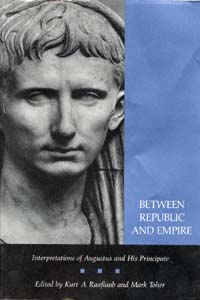 | Title: Between republic and empire: interpretations of Augustus and his principate Author: Raaflaub, Kurt A Published: University of California Press, 1993 Subjects: Classics | Classical History | Ancient History Publisher's Description: Representing five major areas of Augustan scholarship - historiography, poetry, art, religion, and politics - the nineteen contributors to this volume bring us closer to a balanced, up-to-date account of Augustus and his principate. Similar Items |
| 15. | 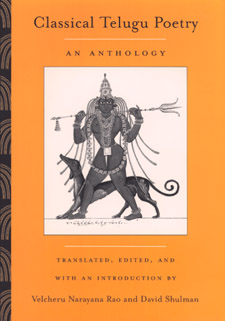 | Title: Classical Telugu poetry: an anthology Author: Nārāyaṇarāvu, Vēlcēru 1932- Published: University of California Press, 2002 Subjects: Literature | Asian Studies | Hinduism | Poetry | Folklore and Mythology | South Asia | Social Theory | Asian Literature Publisher's Description: This groundbreaking anthology opens a window on a thousand years of classical poetry in Telugu, the mellifluous language of Andhra Pradesh in southern India. The classical tradition in Telugu is one of the richest yet least explored of all South Asian literatures. This authoritative volume, the first anthology of classical Telugu poetry in English, gives an overview of one of the world's most creative poetic traditions. Velcheru Narayana Rao and David Shulman have brought together mythological, religious, and secular texts by twenty major poets who wrote between the eleventh and nineteenth centuries. The beautifully translated selections are often dramatic and unexpected in tone and effect, and sometimes highly personal. The authors have provided an informative, engaging introduction, fleshing out the history of Telugu literature, situating its poets in relation to significant literary themes and historical developments, and discussing the relationship between Telugu and the classical literature and poetry of Sanskrit. [brief] Similar Items |
| 16. | 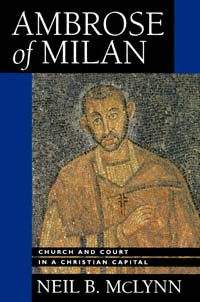 | Title: Ambrose of Milan: church and court in a Christian capital Author: McLynn, Neil 1960- Published: University of California Press, 1994 Subjects: Classics | History | Classical Religions | Christianity | Ancient History | Autobiographies and Biographies Publisher's Description: In this new and illuminating interpretation of Ambrose, bishop of Milan from 374 to 397, Neil McLynn thoroughly sifts the evidence surrounding this very difficult personality. The result is a richly detailed interpretation of Ambrose's actions and writings that penetrates the bishop's painstaking presentation of self. McLynn succeeds in revealing Ambrose's manipulation of events without making him too Machiavellian. Having synthesized the vast complex of scholarship available on the late fourth century, McLynn also presents an impressive study of the politics and history of the Christian church and the Roman Empire in that period.Admirably and logically organized, the book traces the chronology of Ambrose's public activity and reconstructs important events in the fourth century. McLynn's zesty, lucid prose gives the reader a clear understanding of the complexities of Ambrose's life and career and of late Roman government. [brief] Similar Items |
| 17. |  | Title: Final judgments: duty and emotion in Roman wills, 200 B.C.-A.D. 250 Author: Champlin, Edward 1948- Published: University of California Press, 1991 Subjects: Classics | Ancient History Publisher's Description: Freed from the familial and social obligations incumbent on the living, the Roman testator could craft his will to be a literal "last judgment" on family, friends, and society. The Romans were fascinated by the contents of wills, believing the will to be a mirror of the testator's true character and opinions. The wills offer us a unique view of the individual Roman testator's world. Just as classicists, ancient historians, and legal historians will find a mine of information here, the general reader will be fascinated by the book's lively recounting of last testaments.Who were the testators and what were their motives? Why do family, kin, servants, friends, and community all figure in the will, and how are they treated? What sort of afterlife did the Romans anticipate? By examining wills, the book sets several issues in a new light, offering new interpretations of, or new insights into, subjects as diverse as captatio (inheritance-seeking), the structure of the Roman family, the manumission of slaves, public philanthropy, the afterlife and the relation of subject to emperor.Champlin's principal argument is that a strongly felt "duty of testacy" informed and guided most Romans, a duty to reward or punish all who were important to them, a duty which led them to write their wills early in life and to revise them frequently. [brief] Similar Items |
| 18. | 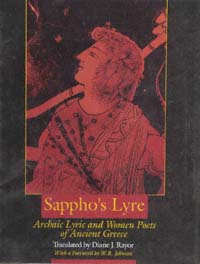 | Title: Sappho's lyre: archaic lyric and women poets of ancient Greece Author: Rayor, Diane J Published: University of California Press, 1991 Subjects: Classics | Classical Literature and Language | Literature in Translation | Poetry Publisher's Description: Sappho sang her poetry to the accompaniment of the lyre on the Greek island of Lesbos over 2500 years ago. Throughout the Greek world, her contemporaries composed lyric poetry full of passion, and in the centuries that followed the golden age of archaic lyric, new forms of poetry emerged. In this unique anthology, today's reader can enjoy the works of seventeen poets, including a selection of archaic lyric and the complete surviving works of the ancient Greek women poets - the latter appearing together in one volume for the first time. Sappho's Lyre is a combination of diligent research and poetic artistry. The translations are based on the most recent discoveries of papyri (including "new" Archilochos and Stesichoros) and the latest editions and scholarship. The introduction and notes provide historical and literary contexts that make this ancient poetry more accessible to modern readers.Although this book is primarily aimed at the reader who does not know Greek, it would be a splendid supplement to a Greek language course. It will also have wide appeal for readers of' ancient literature, women's studies, mythology, and lovers of poetry. [brief] Similar Items |
| 19. | 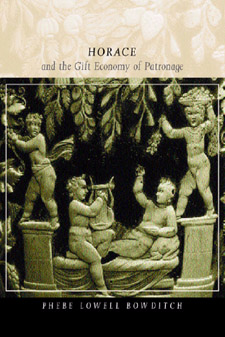 | Title: Horace and the gift economy of patronage Author: Bowditch, Phebe Lowell 1961- Published: University of California Press, 2001 Subjects: Classics | Classical Literature and Language | Poetry | Cultural Anthropology Publisher's Description: This innovative study explores selected odes and epistles by the late-first-century poet Horace in light of modern anthropological and literary theory. Phebe Lowell Bowditch looks in particular at how the relationship between Horace and his patron Maecenas is reflected in these poems' themes and rhetorical figures. Using anthropological studies on gift exchange, she uncovers an implicit economic dynamic in these poems and skillfully challenges standard views on literary patronage in this period. Horace and the Gift Economy of Patronage provides a striking new understanding of Horace's poems and the Roman system of patronage, and also demonstrates the relevance of New Historicist and Marxist critical paradigms for Roman studies. In addition to incorporating anthropological and sociological perspectives, Bowditch's theoretical approach makes use of concepts drawn from linguistics, deconstruction, and the work of Michel Foucault. She weaves together these ideas in an original approach to Horace's use of golden age imagery, his language concerning public gifts or munera, his metaphors of sacrifice, and the rhetoric of class and status found in these poems. Horace and the Gift Economy of Patronage represents an original approach to central issues and questions in the study of Latin literature, and sheds new light on our understanding of Roman society in general. [brief] Similar Items |
| 20. | 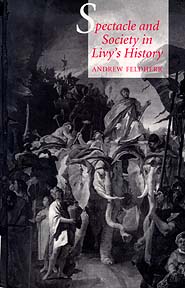 | Title: Spectacle and society in Livy's history Author: Feldherr, Andrew 1963- Published: University of California Press, 1998 Subjects: Classics | Classical Literature and Language | Classical History | Comparative Literature | Literature Publisher's Description: Public spectacle - from the morning rituals of the Roman noble to triumphs and the shows of the Arena - formed a crucial component of the language of power in ancient Rome. The historian Livy (c. 60 B.C.E.-17 C.E.), who provides our fullest description of Rome's early history, presents his account of the growth of the Roman state itself as something to be seen - a visual monument and public spectacle. Through analysis of several episodes in Livy's History , Andrew Feldherr demonstrates the ways in which Livy uses specific visual imagery to make the reader not only an observer of certain key events in Roman history but also a participant in those events. This innovative study incorporates recent literary and cultural theory with detailed historical analysis to put an ancient text into dialogue with contemporary discussions of visual culture.In Spectacle and Society in Livy's History , Feldherr shows how Livy uses the literary representation of spectacles from the Roman past to construct a new sense of civic identity among his readers. He offers a new way of understanding how Livy's technique addressed the political and cultural needs of Roman citizens in Livy's day. In addition to renewing our understanding of Livy through modern scholarship, Feldherr provides a new assessment of the historian's aims and methods by asking what it means for the historian to make readers spectators of history. [brief] Similar Items |